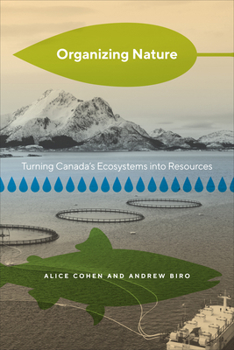Organizing Nature: Turning Canada's Ecosystems Into Resources
Select Format
Select Condition 
Book Overview
Organizing Nature explores how the environment is organized in Canada's resource-dependent economy. The book examines how particular ecosystem components come to be understood as natural resources and how these resources in turn are used to organize life in Canada.
In tracing transitions from "ecosystem component" to "resource," this book weaves together the roles that commodification, Indigenous dispossession, and especially a false nature-society binary play in facilitating the conceptual and material construction of resources. Alice Cohen and Andrew Biro present an alternative to this false nature-society binary: one that sees Canadians and their environments in a constant process of making and remaking each other. Through a series of case studies focused on specific resources - fish, forests, carbon, water, land, and life - the book explores six channels through which this remaking occurs: governments, communities, built environments, culture and ideas, economies, and bodies and identities.
Ultimately, Organizing Nature encourages readers to think critically about what is at stake when Canadians (re)produce myths about the false separation between Canadian peoples and their environments.





